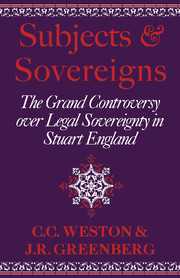Book contents
- Frontmatter
- Contents
- Dedication
- Preface
- 1 The shift in political thought
- 2 The keeper of the kingdom
- 3 The new age of political definition
- 4 That ‘Poisonous Tenet’ of co-ordination
- 5 The curious case of William Prynne
- 6 The idiom of restoration politics
- 7 Co-ordination and coevality in exclusion literature
- 8 The law-makers and the dispensing power
- Appendix: Co-ordination and resistance at the Revolution
- Notes
- Bibliography
- Index
3 - The new age of political definition
Published online by Cambridge University Press: 08 October 2009
- Frontmatter
- Contents
- Dedication
- Preface
- 1 The shift in political thought
- 2 The keeper of the kingdom
- 3 The new age of political definition
- 4 That ‘Poisonous Tenet’ of co-ordination
- 5 The curious case of William Prynne
- 6 The idiom of restoration politics
- 7 Co-ordination and coevality in exclusion literature
- 8 The law-makers and the dispensing power
- Appendix: Co-ordination and resistance at the Revolution
- Notes
- Bibliography
- Index
Summary
Ironically, the elegant and fastidious Charles I, whose aloofness from his subjects contributed to the coming of civil war, introduced the new age of political definition. He did so when he inadvertently provided the parliamentarians with the main elements of their ideology: the tenet that the community was the human source of political authority in the state and the radicalizing principle of a co-ordination in the law-making power. Revolutionary in its implications for the pattern of power in government, the co-ordination principle became overnight the center of an intensive debate over matters of power and authority. That such a debate existed is undoubted. ‘In all the controversies that have arisen’, a contemporary wrote, ‘there is nothing (to my observation) that hath been so universally, really, and continuedly insisted on as this matter of power.’ Not that the king had fore-seen the results; he had not. Yet the co-ordination principle sprang, nevertheless, from his language in 1642, the year when an unprecedented series of declarations and counter-declarations flowed from Charles I and the long parliament.
That principle was rooted in the Answer to the Nineteen Propositions (June 18, 1642), which Charles issued on the eve of the civil war. The king was responding to the Nineteen Propositions (June 2), in which the two houses had put forward demands for naming the king's counsellors, ministers, and judges, controlling the militia, and reforming the church with parliamentary participation.
- Type
- Chapter
- Information
- Subjects and SovereignsThe Grand Controversy over Legal Sovereignty in Stuart England, pp. 35 - 86Publisher: Cambridge University PressPrint publication year: 1981
- 1
- Cited by



